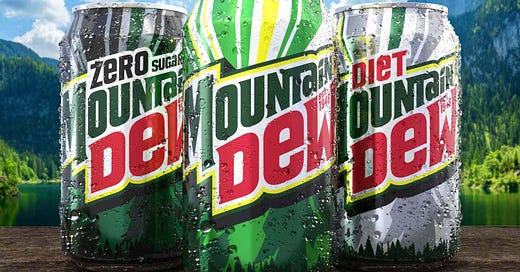Mountain Dew Success Story
Mountain Dew’s journey exemplifies the art of strategic brand management and innovative marketing
When you think of youthful energy and bold flavors in the beverage industry, one name undoubtedly stands out: Mountain Dew. From its humble beginnings as a regional mixer to a global powerhouse with annual sales of $7 billion and a 6-7% market share in the United States, Mountain Dew’s journey exemplifies the art of strategic brand management and innovative marketing.
The Foundations of Mountain Dew’s Success
Unique Product Positioning
Mountain Dew set itself apart early with its distinctive citrus flavor, a bold departure from traditional lemon-lime sodas. The inclusion of orange juice and a higher caffeine content created a unique taste profile that resonated with adventurous consumers. This differentiation became the bedrock of its market positioning, allowing it to carve out a niche in the highly competitive soft drink industry.
Strategic Acquisition by PepsiCo
The turning point came in 1964, when PepsiCo acquired Mountain Dew. This acquisition was pivotal, providing Mountain Dew access to PepsiCo’s vast distribution network and robust marketing resources. By the end of the 1960s, Mountain Dew’s sales had quadrupled, marking its transition from a regional favorite to a national sensation.
Evolution and Market Adaptation
Rebranding for Broader Appeal
In one of the most striking brand transformations, Mountain Dew shed its initial “hillbilly” image to embrace a youthful, active lifestyle identity. The shift was encapsulated in the 1990s with the tagline “Do the Dew,” which appealed to younger demographics and aligned the brand with emerging trends in youth culture. This rebranding solidified Mountain Dew’s place as a cultural icon.
Product Diversification
A key element of Mountain Dew’s strategy has been product diversification. Since 2001, the brand has introduced numerous variants like Code Red, Baja Blast, and Voltage. These innovations have kept the brand fresh and exciting, enabling it to capture new market segments and stay ahead of competitors.
Dominance in a Competitive Landscape
Limited Competition
Mountain Dew’s unique flavor and positioning have shielded it from significant competition. Coca-Cola’s attempts to challenge its dominance with products like Mello Yello, Surge, and Vault have largely fallen short, cementing Mountain Dew’s position as a leader in the citrus soda category.
Cultural Agility
The brand’s ability to adapt to cultural trends has been remarkable. In the 1990s, Mountain Dew’s association with extreme sports captured the spirit of a generation. More recently, its integration into gaming culture has kept the brand relevant among Gen Z and millennials.
Mountain Dew in India: A Localized Success Story
Localized Marketing Campaigns
Mountain Dew’s entry into India was marked by a clever adaptation of its global tagline. “Do the Dew” became “Darr Ke Aage Jeet Hai” (Victory lies beyond fear), a message that resonated deeply with Indian youth by encouraging them to overcome challenges and embrace their ambitions.
Celebrity Endorsements
To connect with Indian audiences, Mountain Dew enlisted Bollywood superstars like Hrithik Roshan and Salman Khan. These endorsements amplified brand awareness, leveraging the actors’ immense popularity to attract a broad consumer base.
Rapid Market Penetration
In 2003, within just three months of its launch in India, Mountain Dew captured a 4-5% market share in the soft drinks category—a feat PepsiCo executives described as unprecedented. By 2020, Mountain Dew had established itself as a significant player with a 3.6% market share in India’s competitive carbonated drinks sector.
Engaging Youth Demographics
Recognizing the growing influence of gaming and esports in India, Mountain Dew has partnered with influencers and sponsored gaming events to connect with Gen Z and Gen Alpha audiences. This strategy has reinforced its youthful and adventurous brand image.
Adapting to Local Tastes
While staying true to its signature citrus flavor, Mountain Dew has introduced variants tailored to Indian palates, ensuring its relevance in a market where traditional cola drinks dominate.
Distribution Strategy
PepsiCo’s robust distribution network in India has been instrumental in Mountain Dew’s growth, ensuring availability in both urban centers and remote areas.
Lessons in Brand Management
Mountain Dew’s success offers a masterclass in brand evolution, market positioning, and cultural adaptability. By continually refreshing its image, diversifying its product line, and aligning with cultural trends, Mountain Dew has maintained its relevance and leadership for over six decades.
Its ability to seamlessly adapt global strategies to local markets, as seen in India, underscores the importance of cultural sensitivity in international brand expansion. As health-conscious trends reshape the beverage landscape, Mountain Dew’s future will depend on its capacity to innovate while staying true to its energetic and bold brand ethos.
The question now is: How will Mountain Dew continue to redefine itself in a world that’s increasingly looking for healthier, sustainable choices? Whatever the answer, one thing is clear—Mountain Dew has shown it knows how to rise to the challenge.




